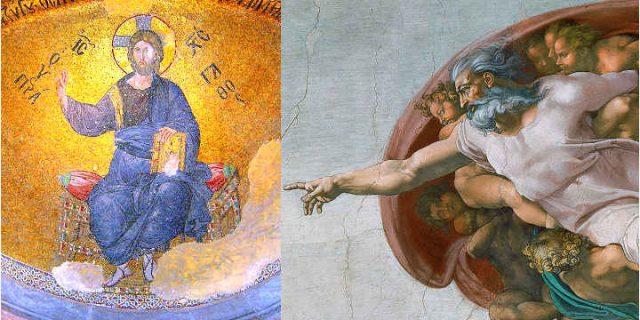The behaviour of God, as described in the Old Testament, is a common target for sceptics. “How could anyone worship such a tribal, warlike God?”, they say.
Many Christians, on the other hand, see no problem. They think God’s actions are just, and quite compatible with the revelation they see in Jesus and the New Testament teaching that God is love.
I think both of these views are mistaken because I think they are ignoring important information.
Yahweh according to the critics
Criticisms of the morality of God in the Old Testament have a reasonable basis. God is described as commanding all manner of violence and bloodshed as the Israelites enter and conquer the Promised Land. For example, Deuteronomy 7 details how the Israelites are to eliminate and drive out the nations living in Canaan, with verse 16 saying:
You must destroy all the peoples the Lord your God gives over to you. Do not look on them with pity
Now other passages in the Bible, and the archaeological and historical record, suggest that these commands were never carried out to the extent described, but this doesn’t alter the fact that God is portrayed as commanding actions that would be war crimes today.
Two sides to the story
But this isn’t the whole story, and atheists tend not to point out the other side to the Old Testament God. The warlike Yahweh seems to be a tribal god just like the gods of other nations – Chemosh, Baal, Dagon, etc – but something remarkable happens within the Old Testament.
Alongside the terrible warlike commands, God is portrayed as loving, concerned about people, caring for the Israelites like a mother cares for her child, or a lover cares for his beloved. The tribal god Yahweh is seen more and more as the one true creator God, who doesn’t always support the king, but cares for justice for the poor. Psalm 10 is just one of many examples:
You hear, O LORD, the desire of the afflicted;
you encourage them, and you listen to their cry,
defending the fatherless and the oppressed
Apart, perhaps, from the brief reign of Akenhaten in Egypt, this ethical monotheism is far “above” the beliefs of the surrounding nations. The God of this insignificant tribe became the most believed and arguably most ethically influential of any God in the entire world.
So side by side in the Old Testament we see commands to kill and commands to show mercy. To fairly describe and assess the Old Testament, we need to recognise both sides of this dilemma and try to understand why there is such a dichotomy of views.
The Christian view
Christians tend to see a totally different God than the the one condemned by atheists. God is both loving and just, they say. Do an internet search on the angry God of the Old Testament and you’ll find any number of christian websites explaining that God’s love and justice are two sides of the same coin, that justice requires judgment of sin, and so the supremely loving God was quite justified in wiping out evil nations that threatened his saving work via the Jews. In fact his holy love demanded this judgment and punishment.
God’s character?
Yet more and more Christians are uncomfortable with this. The sins committed by the Canaanites seem no worse than what we see committed today, so why should they be punished so severely, but not us? It doesn’t look like love, it doesn’t look like what Jesus would do. Genocide and war crimes cannot and should not be overlooked and called anything other than what they are.
Does God’s loving character allow him to order summary execution? Can we call summary execution a just and loving punishment? Surely God’s justice is restorative and full of grace, not destructive and punitive? I feel that Christians who hold this view are demeaning God’s character in an attempt to support their dogma about the Bible.
Christians believe that we see God’s character most in Jesus, who condemned striking out against enemies, and demanded love and forgiveness even for those who persecute or even kill. Admittedly there are difficult passages and judgments in the New Testament, especially in the book of Revelation and in a couple of Jesus’ parables, but these are not literal passages but in some ways symbolic ones.
It should also concern Christians that many episodes of violence committed by Christians (or apparent Christians) – e.g. the Crusades, killing of Native Americans, the genocide in Rwanda – have used language reminiscent of the Old Testament commands to justify atrocities. We can never be too careful about what we ascribe to God!
So conservative Christians also seem to me to have not correctly considered the evidence. Anyone who can justify mass killing may not have understood Jesus, his non-violent teachings and the claim that he is the best picture of God that we have.
When all else fails, start with the facts
It seems to me that both sides are starting with their dogma and emphasising and explaining the facts accordingly. But if we start with the apparent facts as determined by historians, the picture is clearer.
The Old Testament in its time
It appears that the original belief of the Israelites was in a tribal god, just like their neighbours. They were a small nation, often sandwiched between stronger powers, and their hold on their land was sometimes tenuous. So they saw their God as giving them a divine right to the land and fighting on their behalf.
They had their founding stories. Their creation and flood stories appear to be monotheistic re-workings of more ancient Akkadian, Sumerian and Babylonian myths. The stories of their nation’s beginning via the patriarchs Abraham, Isaac and Jacob, the exodus from Egypt under Moses and their conquering of the Promised Land under Joshua, are written as historical sagas, but it is uncertain how much of these stories are legend and how much history. (Scholars differ in their views from minimalists who think very little of these stories are historical to maximalists who think a significant amount is historical.)
Commands to wipe out enemies, and reports of successfully doing so, appear to be part of the culture of the day, but don’t mean these things actually happened. They were likely more rhetoric than real, both for the Jews and for the neighbouring nations.
We can see this clearly in the book of Joshua, where chapters 1-12 tell of a violent takeover of Canaan, where cities are razed to the ground and their inhabitants mercilessly killed. Chapter 12 lists 33 kings who were defeated and their land given tothe tribes of Israel. But chapters 13-24 tell a different story, as story of slow infiltration with some fighting, and at least 9 of the cites previously said to be conquered actually remaining in Canaanite hands. Joshua tells two very different stories, and the archaeology indicates the second is truer to what happened and the first is obviously “idealised” and exaggerated.
A higher view of God
But in the Old Testament, the unimaginable happened, and a much higher and more ethical form of religion gradually came into prominence through the teachings of the prophets and the writings of the priests, reaching a high form that has endured to this day in the teachings of Jesus.
And so, scholars tell us, the Old Testament is the work of different hands, some who thought God supported ethnic cleansing, and some who thought he wanted mercy and compassion, especially towards the poor and downtrodden. The former gradually gave way to the latter.
If this is basically true, then we can see that both atheists and conservative Christians begin from a wrong place.
The atheists find the most damning picture of God and act as if that was the only picture in the Bible. They ignore the development of a much higher ethic and a more altruistic monotheism. The Christians too ignore the development of the understanding of God in the Bible, and try to equate the early primitive form with the later “higher” belief, and try to justify the unjustifiable.
So is God in the Old Testament, or not?
Many Christians find this historical understanding a problem. They have been told that the Bible is the very word of God and correct in all it says and for all time. They have to somehow affirm the different sides of the picture of God they find in the Bible, even if that is a stretch.
But the Bible doesn’t claim to be all that conservative Christians claim on its behalf. It might be that we would like God to have revealed himself in a dictated textbook of divine facts, but he doesn’t seem to have done so. But our faith doesn’t need to leak out because of that.
I can see no reason why God couldn’t have used a gradual process to prepare people for Jesus, just as he used a gradual process to create the universe from the initial big bang, and to create human life from the initial single cell life forms.
CS Lewis, one of the most influential Christians of the past century, and an expert on ancient languages, literature, myth and history, thought exactly that. He said:
If you take the Bible as a whole, you see a process in which something which, in its earliest levels …. was hardly moral at all, and was in some ways not unlike the Pagan religions, is gradually purged and enlightened till it becomes the religion of the great prophets and Our Lord Himself. That whole process is the greatest revelation of God’s true nature. At first hardly anything comes through but mere power. Then (v. important) the truth that He is One and there is no other God. Then justice, then mercy, love, wisdom.
I believe this understanding is true to the historical facts and to the Bible. It preserves and emphasises the truth that God is revealed most fully in the non-violent Jesus. Murder and mayhem were not his commands at all, but early misunderstandings that were later corrected. The Bible is inspired by God, but is more a record of his process of revelation than an ethics textbook. We can read it and be edified – much more than we would be if we believed God really commanded all that bloodshed.
A challenge for for the critics
Many atheists accept this historical understanding too, even though they don’t believe there was a God behind the events, but just see it all as cultural evolution.
But too many atheists prefer to ignore the historical facts and use the early books of the Old Testament as an argument against christian belief. That may be an effective line of attack against conservative Christians, but it is largely meaningless against a christian who begins with the known historical and cultural facts.
Christianity stands or falls with Jesus
Christians believe Jesus shows us exactly what God is like. Anything is contrary to the character of Jesus cannot be a correct understanding. Jesus was loving towards people who came to him. He could be severe on those who were damaging the lives and faith of others, but I cannot imagine him ever condoning or ordering genocide.
Yahweh as the ancient Israelites conceived him may have been an incomplete picture of God, but the true God is revealed in Jesus.
Graphic: Wikimedia Commons and Wikipedia





